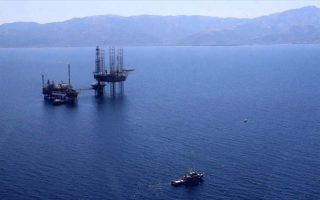Turning the 3+1 into a quadrilateral alliance

Six years ago, the American Jewish Committee (AJC) and the Hellenic American Leadership Council (HALC) joined forces in support of the efforts of congressmen Gus Bilirakis (R-FL) and Ted Deutch (D-FL) as they formed the Congressional Hellenic Israel Alliance (CHIA) caucus.
Our reasoning was simple: In an increasingly unstable Eastern Mediterranean, the US needed reliable allies and partners. In 2013, the emerging partnership among Cyprus, Greece and Israel presented Washington with the tantalizing option of working with partners who shared both America’s interests and values.
We also believed that the US policymaking structure was not fully set up to capitalize on these positive developments in the Eastern Mediterranean. State Department bureaus and congressional foreign affairs subcommittees were organized with Europe as one jurisdiction and the Middle East/North Africa as another. Issues concerning Cyprus – less than an hour’s flight from Tel Aviv – were considered by the same committees working on Finland and France rather than Israel and Egypt. The only country linking these different parts of the policymaking bureaucracy was Turkey.
Fortunately, CHIA and Senator Bob Menendez (D-NJ) set out to push for a new American strategy in the Eastern Mediterranean. They have now been joined by Senator Marco Rubio (R-FL) and Congressman David Cicilline (D-RI) to take these efforts to the next level with the Eastern Mediterranean Security and Energy Partnership Act.
At a time when the Eastern Mediterranean is emerging as a vital geographic region, Congress has begun a laudable process, providing the tools for the US to capitalize on the existing partnership among the region’s Western democracies. The East Med Act lays the foundations for a comprehensive US strategy in the region, covering energy cooperation, security matters and countering malign influences in the region.
The discovery of natural gas has played a key role in bringing the region together. The East Med Act bolsters ongoing energy diplomacy by authorizing the establishment of a US-Eastern Mediterranean Energy Center and the participation of the US in the Eastern Mediterranean Gas Forum, while also requiring administration analyses of methods of bringing this gas to market, including the proposed East Med Pipeline planned by Israel, Cyprus and Greece.
Energy has led to deeper cooperation in several other areas, most notably in security. For too long, there was only one country in the world that had a status of forces agreement with Israel – the US. Today, Greece and Cyprus have brought the number up to three. The East Med Act can lead to more convergences between the forces of the four countries and, ultimately, to a stabilizing security alliance in the region.
This bill makes investments in Greece’s military, including the increase of International Military Educational Training program funding and the reintroduction of Foreign Military Assistance. These modest investments will help seamlessly turn the trilateral security cooperation among Israel, Greece and Cyprus into a true quadrilateral partnership with the US.
The East Med Act will also repeal provisions prohibiting the export and transfer of defensive articles and arms to the Republic of Cyprus. As long as this unjust embargo remains in place, the security partnership among Greece, Cyprus and Israel will inevitably have an artificial ceiling on it.
When the embargo is no longer applicable to the Republic of Cyprus, the US can finally establish a more robust security relationship with the Republic of Cyprus. This helps not only the US-Cyprus bilateral relationship but also enhances NATO-EU security cooperation and provides greater strategic depth for Israel.
Finally, the East Med Act provides important checks on malign actors in the region. From banning F-35 sales to Turkey to requiring reports on Turkey’s violations of Greek airspace and Cyprus’ EEZ, as well as countering Russian activity in the region, Congress is shining a spotlight on aggressive powers interested in dominating the region, not fostering cooperation.
The East Med Act is advancing at a rapid pace. It has already passed the Senate Foreign Relations Committee and some of its provisions passed through the entire Senate in that body’s version of the National Defense Authorization Act. Three of its main sponsors have visited the region recently – Senator Menendez traveled to Greece and Cyprus immediately after the introduction of the bill, and congressmen Deutch and Bilirakis went to Israel, Cyprus and Greece in early July.
The East Med Act is also urgently needed. Turkey’s repeated violations of Greek airspace and Cyprus’ exclusive economic zone are beyond provocative. Russia has expanded its naval presence in the region and, despite heated US objections, is threatening to place S400 missile systems in Turkey. Iran’s support of terrorist groups in the Mediterranean continues unabated.
To the great benefit of Europe and the world, the US once provided support for the postwar European Steel and Coal community that turned into the European Union. It can help plant the seeds for something equally ambitious in the Eastern Mediterranean by turning the trilateral partnership into a true quadrilateral.
The East Med Act is an important step in that direction. Its congressional passage must be prioritized.
Endy Zemenides is executive director of the Hellenic American Leadership Council and David Harris is CEO of American Jewish Committee (AJC).





